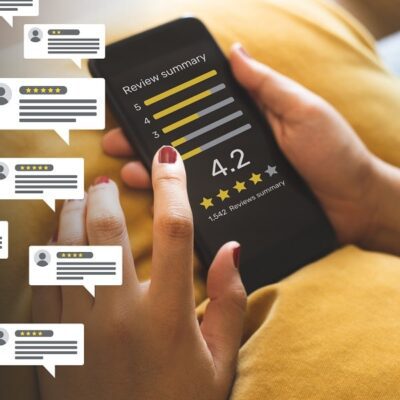If you work in the SEO industry, then you’ve likely heard of ChatGPT. But what is ChatGPT? ChatGPT is a chatbot that uses artificial intelligence (AI) to generate realistic sounding conversations and content.
By leveraging neural network and machine learning algorithms, ChatGPT can help you produce highly engaging content faster than ever before. In some cases it can completely eliminate the time-consuming process of crafting keyword-rich articles from scratch.
In this article we will discuss what ChatGPT is, how it works, how to use it, and why it’s important in regards to SEO, and how it can put your business ahead of others in SEO rankings. Let’s get started!
What is ChatGPT?
ChatGPT stands for generative pre-trained transformer. ChatGPT is an artificial intelligence (AI) chatbot developed and owned by OpenAI, a research laboratory based in San Francisco. It allows users to enter in a prompt and have a natural conversation or content output with the AI platform either using text or speech.
The chatbot has been designed to represent human conversation patterns and provide personalized answers to user inquiries. It is also powered by unsupervised learning. This means it is able to learn from conversations that it has had with people and draw its own conclusions without being instructed on how to respond.
When it comes to the acronym GPT, the term generative refers to the AI “generating” new text based outputs. The term pre-trained refers to the large language models that ChatGPT takes into account. This also includes the patterns and language it gradually learns and takes on over time. The term transformer refers to a specific neural network architecture that is designed to process sequences of language related data.
As a generative AI, anyone can access and use ChatGPT generated content as needed. The more details you include, the more detailed your output can be. Elements such as these are what make ChatGPT a powerful tool for businesses. If a business is seeking to increase customer engagement and drive personalization for specific content needs, ChatGPT could be a great tool to utilize.
How Does ChatGPT Work?
It all starts with the user having a question or a prompt they would like to enter. The artificial intelligence chatbot works by breaking down large language models and natural language processing (NLP) into smaller pieces and analyzing them. It looks at phrases, sentences, and words to identify patterns and respond in natural, human-like ways.
As the conversation progresses, or when more details are included, ChatGPT is able to understand the context of the conversation and provide intelligent responses accordingly. With this type of technology, there’s almost no limit to what kind of conversations can be had.
Why ChatGPT is Important for SEOs Specifically
For SEOs, ChatGPT is a powerful tool that accelerates natural language processing and machine learning tasks. It allows them to quickly generate keywords and search intent tags, analyze sentiment and tone, understand customer sentiment data points, identify the right customers for ads, improve website content optimization, and more.
ChatGPT’s simple setup process and intuitive interface makes it easy to integrate its proprietary AI-based technology into search strategies, ensuring that SEOs get the highest return on their investment.
In addition, its advanced algorithms are highly effective in sifting through large-scale datasets for valuable insights about customer preferences and behavior. This can further enhance the effectiveness of SEO efforts.
How Do I Use ChatGPT While Utilizing SEO?
Individuals are using ChatGPT in a variety of ways. Whether it’s writing a blog article about a specific topic, or building to-do lists for an individual, there are a variety of ways in which a person can use ChatGPT. In this section we will be discussing how SEO and AI can help each other and some of the best ways to use ChatGPT for SEO.
AI Content Generation
One of the most popular functions that ChatGPT is popular for is writing and generating new pieces of content. There are a number of ways in which ChatGPT is creating human like text:
- Blog Articles: ChatGPT can create full-length blog articles based on the outline, parameters, and details you include in your input. The more specific you are in what you ask (such as adding keywords or other questions) the more detailed the blog article will be.
- Alt and Meta Descriptions: To help stay optimized in your content, ChatGPT can help you create meta descriptions for articles as well as alt descriptions for images.
- SEO Titles: Similar to alt and meta descriptions, ChatGPT can provide insight into optimized SEO titles.
- FAQs: ChatGPT can help you generate a list of questions that may be asked frequently based on the topic you’re searching on.
- Web Pages: Similar to blog article content, ChatGPT can help you write content for your web pages as well.
- Social Media Posts: Sometimes it can be hard to come up with engaging social posts. ChatGPT can help you find a variety of ways to write a social post.
- Email Pitches: Email marketing is a great way to engage and connect with customers. If you’re having a hard time writing engaging emails, ChatGPT can be there to help write an effective email pitch.
- Ad Copy: Sometimes advertisement copy needs to be set within a certain parameter or word limit. ChatGPT can help keep you within that limit while also having effective content.
- Brainstorming: Sometimes it’s hard to come up with good copy or content ideas. ChatGPT is a great platform to help generate potential ideas within your industry or platform.
While ChatGPT generates all kinds of content, it is still very important to check any type of generated content. Sometimes it can lack certain information you were asking for, inaccuracies, or the intent may be off.
Note: While ChatGPT can write these pieces of content for your business, it’s probably best to avoid using it for important pieces of content such as blog articles or web pages.
Keyword Research and Organization
Keyword research is an extremely important and beneficial part of any SEO strategy. Without having a keyword strategy in place, your SEO strategy won’t succeed over time. With this in mind, sometimes it can be hard to know where to start with finding the best keywords for your business.
It’s always important to use SEO tools such as Semrush, Moz, Ahrefs, etc. when conducting keyword research. While this isn’t the most beneficial platform to get valuable keywords, ChatGPT can help generate ideas of where to start your keyword research.
You can start by typing in a few keywords you already know or have in mind and ask for related keywords to them. From there, ChatGPT produces a list of related keywords based on its understanding of the search results they’re aware of.
While ChatGPT will produce a list of these keywords, it might be missing some of the crucial information such as the data to back up its value. Some of these factors could be knowing a keyword’s keyword difficulty, volume, intent, etc. This can be a great way to brainstorm new keyword ideas, but also be aware it won’t know all the search insight. Only the insight and information it already knows.
Code Generation and Technical SEO
ChatGPT is helping individuals generate code and build things. With this in mind, it’s no different for specific technical SEO tasks.
ChatGPT can also assist with SEO elements such as: schema markups, robots.txt directives, redirect codes, and building widgets and free tools to promote via link outreach, among others.
As with any type of content creation, you must overlook the code that ChatGPT generates. Your site’s template, hosting environment, CMS, and more can break if the code ChatGPT generates is incorrect. Be sure to be wary of this and be 100% about the coding you add in directly from ChatGPT.
Link Building
ChatGPT can generate lists of outreach targets, emails, free tool ideas, and more that may be beneficial in assisting with link building work. While this can be a very incentivizing thought, you shouldn’t prioritize this as being your #1 link building tool. GPT-3 might still be trained on old data. With this in mind, the information you’re getting from ChatGPT might be wrong or outdated.
Search Engines and Chatbots Coming Together
Three of the most popular search engines (Google search, Bing, and Baidu) are now looking at integrating a chatbot such as ChatGPT into their search products. This choice was made in a decision to help get direct answers or help be more engaging in an individual’s search request.
All three search engines are looking at utilizing large language models (LLMs). Microsoft’s Bing is looking at utilizing the same technology as ChatGPT. It is widely available now, although there is a waiting list for unfettered access. Google’s AI-powered search engine, BARD, was announced on February 6th, 2023. It is currently being tested by a small group of testers. Baidu is using what they call an ERNIE Bot that will be available in March 2023.
Many people have talked about how this will change the way people relate to search engines. As well as the risks that could evolve from this human-machine interaction. Over time we will find the answers as to whether or not this integration is beneficial or not. As well as knowing how SEO strategies and processes will change over time.
What is ChatGPT’s Future with SEO?
By giving people an easy way to create natural language conversations and AI-powered responses for customers, ChatGPT can potentially help individuals in bridging the gap between search engines and consumers alike.
This can allow marketers to better target their audiences with more detailed and engaging content. For any SEOs looking to become more efficient with their workflows and campaigns, ChatGPT can be a powerful tool that could bring benefits to the way you write content.
If you’re ever in need of help with SEO optimizations, look to Boostability! Boostability has white label SEO services that can help your customers succeed online. Learn more today!










